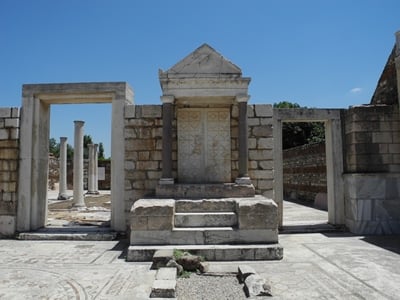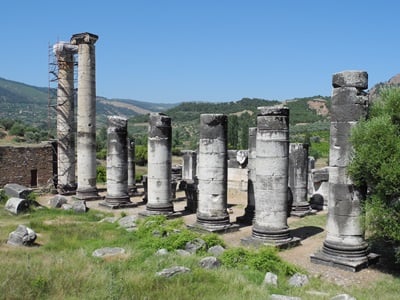Sardis was the fifth of seven churches in Asia Minor to receive a message from Jesus Christ in Revelation 2-3. What can we learn from this message today?

Ruins of ancient Sardis (photo by Joel Meeker).
When Jesus Christ gave His message to the church at Sardis at the end of the first century, there were congregations in other nearby cities. Yet, as noted in the introductory article “Seven Churches of Revelation,” Sardis and six others were chosen by Christ to receive messages that were relevant to them at the time. These churches also seem to represent the chronological development of the Church throughout the centuries, and the messages are timeless instruction for God’s people.
This article will focus on the history of Sardis and then provide an explanation of Christ’s message to this congregation and its relevance for us.
History of Sardis
Sardis was “one of the oldest and most important cities of Asia Minor, and until 549 BC, the capital of the kingdom of Lydia. It stood on the northern slope of Mt. Tmolus; its acropolis occupied one of the spurs of the mountain. At the base flowed the river Pactolus which served as a moat, rendering the city practically impregnable. Through the failure to watch, however, the acropolis had been successfully scaled in 549 BC by a Median soldier, and in 218 by a Cretan (compare Rev 3:2, Rev 3:3)” (International Standard Bible Encyclopedia, 1939, “Sardis”).
Earthquakes were common in this part of the world, and in A.D. 17 the city was destroyed by such a tremor. The Roman emperor Tiberius “remitted the taxes of the people and rebuilt the city, and in his honor the citizens of that and of neighboring towns erected a large monument, but Sardis never recovered its former importance (compare Rev 3:12)” (ibid.).
A small Turkish village called Sert is now located among the ancient ruins. The chief remains of the ancient city are the triple walls surrounding the hill on which the acropolis stood and two upright columns from the temple of Cybele.
The message
“And to the angel of the church in Sardis write, ‘These things says He who has the seven Spirits of God and the seven stars: “I know your works, that you have a name that you are alive, but you are dead. Be watchful, and strengthen the things which remain, that are ready to die, for I have not found your works perfect before God. Remember therefore how you have received and heard; hold fast and repent.
“Therefore if you will not watch, I will come upon you as a thief, and you will not know what hour I will come upon you. You have a few names even in Sardis who have not defiled their garments; and they shall walk with Me in white, for they are worthy.
“He who overcomes shall be clothed in white garments, and I will not blot out his name from the Book of Life; but I will confess his name before My Father and before His angels. He who has an ear, let him hear what the Spirit says to the churches”’” (Revelation 3:1-6).
The explanation
Like Christ’s messages to the preceding congregations, this one is also addressed “to the angel of the church” (Revelation 2:1, 8, 12, 18; 3:1). The word angel is translated from the Greek word aggelos, which means “a messenger, envoy, one who is sent, an angel, a messenger from God” (Thayer’s Greek Definitions).
The context shows that these messages are not sent to these messengers themselves but rather to each “as presiding over or representing the churches, for what is recorded pertains to the churches, and was evidently designed to be laid before them. It was for the churches, but was committed to the ‘angel’ as representing the church, and to be communicated to the church under his care” (ISBE, ibid.).
The message begins with the familiar statement, “I know your works” (verse 1). After conveying this important point, Christ states, “You have a name that you are alive, but you are dead” (verse 1). These few words are the major focus of the entire message to Sardis.
Ruins of a Jewish synagogue at Sardis (photo by Joel Meeker).
Although He was also God, Jesus always gave deference to His Father. So it was the Father’s name that was to be used to identify God’s people. Throughout the New Testament, the Scriptures predominantly identify God’s people as the Church of God. To see the 12 scriptures that clearly make this point and to read more about this identifying principle, see “True Church: What Is Its Name?”
In saying “you have a name that you are alive” (Revelation 3:1), Jesus was acknowledging that the Church of God at Sardis had the correct name and in that sense was spiritually alive. Yet in saying “but you are dead” (verse 1), Jesus was telling them that it took more than the correct name to please God. Sadly, many in this church were spiritually dead—their works were not “perfect before God” (verse 2). Their actions were not complete—not fully exemplary of a living Christian faith.
As for this issue regarding God’s name, history shows that from the latter part of the first century onward, many deviations from the teaching of Christ and the apostles began to develop within Christianity. Put another way, many began to claim that they were Christians and followers of God, yet according to their works, they denied God.
In concluding His famous Sermon on the Mount, which gave an overview of the major themes that Jesus preached, our Savior pointedly said, “Not everyone who says to Me, ‘Lord, Lord,’ shall enter the kingdom of heaven, but he who does the will of My Father in heaven. Many will say to Me in that day, ‘Lord, Lord, have we not prophesied in Your name, cast out demons in Your name, and done many wonders in Your name?’ And then I will declare to them, ‘I never knew you; depart from Me, you who practice lawlessness!’” (Matthew 7:21-23).
Again, just calling oneself Christian or part of the Church of God is not sufficient. God expects accompanying works—the same deeds that Jesus and the apostles practiced—for anyone to truly belong to God.
Because many of the members at Sardis had become spiritually dead, Christ warned them to “be watchful, and strengthen the things which remain” and to “hold fast and repent” (Revelation 3:2-3). Jesus also warned them to watch for His return—an indication that people representing Sardis in the historical development of the Church may be alive at His second coming.
Christ’s message to Sardis concludes with the encouraging words that some among this church would remain spiritually faithful: “You have a few names even in Sardis who have not defiled their garments” (verse 4). These people will be clothed in white garments, symbolic of righteousness (Revelation 19:8) and be in the “Book of Life” (Revelation 3:5)—a record of those who will live forever in the family of God.
A lesson for us
Like the messages to the previous congregations, the one to Sardis closes with the sober warning: “He who has an ear, let him hear what the Spirit says to the churches” (Revelation 3:6). So what would Christ have us learn from His message to this church?
Ruins of the Temple of Artemis at Sardis (photo by Joel Meeker).
There was only one form of Christianity originated by Christ and taught by the apostles. God intended that the faith originally established by His Son remain the only form of Christianity throughout the ages. He wanted the members at Sardis and people throughout time to remain zealous for His way of life and pure in conduct. Yet church history and the progressive revelation of the messages to the seven churches of Revelation show a sustained effort to water down, change or deny the original teachings of Christ.
What about you? Are you striving to learn the true Christianity as taught and practiced by the early Church? And as you learn it, are you living it? Notice the admonitions of two first-century apostles to live as God requires.
- Paul wrote: “For not the hearers of the law are just in the sight of God, but the doers of the law will be justified” (Romans 2:13).
- James said, “But be doers of the word, and not hearers only, deceiving yourselves” (James 1:22).
Don’t be like the members at Sardis who became spiritually dead. Be zealous and live your life as God demands!
If you have questions about the original Christianity taught by Christ or questions about how to put Christ’s teaching into practice, feel free to contact us. We are dedicated to helping you learn how to put His wonderful way of life into practice. Read more in the articles about “Change.”





